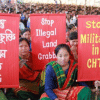Rhetoric cannot hide CHT accord failures

It is truly disheartening that even after 26 years since the Chittagong Hill Tracts Peace Accord was signed between the then Awami League government and the leaders of the Parbatya Chattogram Jana Sanghati Samiti (PCJSS), most of the key clauses have not been implemented. The government claims that they have fully implemented 65 of the 72 sections, while PCJSS says they have implemented only 25 sections, with 18 others being only partially implemented. So, what about the remaining 29 sections that have yet to see the light of day?
Over the last 26 years, the CHT has faced indiscriminate land grabbing, agricultural monoculture, devastating hill cutting, and stone extraction by private corporations as well as state bodies. The indigenous people face regular eviction with depleting land to grow food and live on. In addition, they face violence (including sexual violence against women and girls), with little or no legal recourse and the perpetrators enjoying impunity that is hardly challenged. Access to health and education is also very poor among these communities.
Recently, CHT civil society leaders and legal experts have been gravely concerned by legal proceedings to question the Chittagong Hill Tracts Regulation 1900, which provides for traditional indigenous institutions and upholds customary laws, conventions and practices relating to lands, territories, resources and the family laws of the indigenous communities. To invalidate the 1900 Regulation would be inconsistent with the spirit of the Accord.
Despite the partial implementation of certain clauses, such as the establishment of the CHT Affairs Ministry and regional councils, the fact is these bodies remain largely non-functional. The CHT Land Commission also remains non-operational as there are no regulations in line with the relevant act, with a draft of the rules formulated for the act still sitting with the concerned ministry. Other crucial steps that have yet to be taken for the Accord to be implemented include an exclusive voter list for permanent indigenous residents and enlisting members of the communities in the police force.
Despite multiple declarations in its manifestos, in the 15 years of the AL's rule, the Accord has remained largely unfulfilled. Will the government, which predictably will retain power after the upcoming elections, keep its promises to the indigenous communities of the CHT this time around?

 For all latest news, follow The Daily Star's Google News channel.
For all latest news, follow The Daily Star's Google News channel. 









Comments